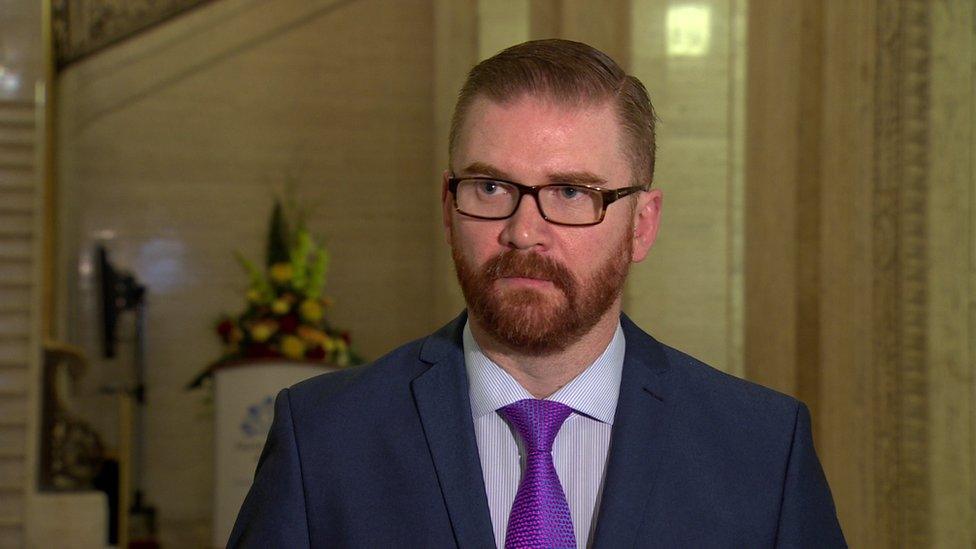Renewable Heating Incentive 'wasted millions'
- Published

The scheme was meant to encourage businesses to move from generating their heat using fossil fuels to more renewable sources like wood
An email that was worth hundreds of millions of pounds to the taxpayers of Northern Ireland and ignored by the Department of Enterprise has been obtained by BBC Spotlight.
In 2014, a whistleblower sent the email, to the Department of Enterprise, Trade and Investment.
It warned them that the Renewable Heat Incentive (RHI) was seriously flawed.
In the email, the whistleblower is remarkably clear about where the scheme was going wrong.
The warning was not acted on and the scheme continued on. It was closed earlier this year with a likely overspend of £400m and potentially even more.
'Burn to earn'
The department has acknowledged a series of blunders in how the scheme was set up.
Firstly, the subsidy paid to businesses for the heat that they generated was too high.
It is very likely to be more than the cost of the wood over the 20 years of the scheme - a crucial point missed by civil servants.
Imagine your home heating oil costing you 2p an hour. And for every hour you keep the heating on you get 3p from the government.
That was similar to the flaw within RHI, so we ended up with a scheme where "the more you burn, the more you earn" - a scheme that was not only economically calamitous, but potentially environmentally damaging.
More smoke
Patsy McGlone, who chaired the DETI committee when RHI was set up, said: "This is the paradox of it, that burn more wood and you get more money.
"It's not an incentive to improve or enhance the environment. It's an incentive to put more smoke up into it."
As well as the rate being too high, the department missed important cost controls introduced in Great Britain.
Firstly tiering - or paying two different rates. In Britain, the rate paid each year starts off high to incentivise customers to switch to a wood-burning boiler. Then it drops off significantly to less than the cost of production - avoiding "the more you burn, the more you earn" issue.
Tiering was not introduced in Northern Ireland. Here, there was one flat rate which was too high.
But by far the biggest alarm bell missed by the department was the warning of a whistleblower as far back as 2013.
She first expressed concerns to then enterprise minister Arlene Foster, who referred her to the team of civil servants in DETI which dealt with energy to investigate.
The woman met them in autumn 2013. The email obtained by Spotlight shows she says she urged them to address the flaws in the scheme.

Patsy McGlone said the scheme became an incentive to put more smoke into the environment
Nothing was done.
In May 2014, she emailed the department, apparently exasperated.
"What we are seeing on the ground in Northern Ireland is that buildings are using more energy than before because it pays them to do so," she said.
"The flat rate means there is no incentive at all to be efficient, so the heat in buildings is on all year round with the windows open everywhere.
"When we had spoken (referring to the autumn 2013 meeting) you did not believe that people would do this. But believe me it's happening.
"It's got to a stage where it cannot be ignored any longer."
It wasn't acted upon.
The scheme was closed earlier this year after a huge spike in applications in late 2015 finally broke the budget.

The whistleblower first expressed concerns to then enterprise minister Arlene Foster
Mrs Foster, now Northern Ireland's first minister, did not answer our question about whether she made any other effort to follow up on the claims of the whistleblower.
She pointed to a comment by the chief civil servant in the Department for the Economy, the new name for DETI, who said she had dealt with the whistleblower "entirely appropriately".
But she acknowledged that investigations into the whistleblower's claims "should have highlighted the failings of the scheme and actions should have been taken".
Actions were not taken and the NI taxpayer has been left with a bill for hundreds of millions of pounds.
Enough to pay for the new Omagh hospital, converting the A26 at Frosses in County Antrim in to dual carriageway, the Belfast Interchange Project and the Belfast Rapid Transit system - with £15m left over.
Ulster Unionist leader Mike Nesbitt has said Mrs Foster should consider her position over the issue.
"What is now in the public domain proves hundreds of millions of pounds were wasted needlessly, the department was dysfunctional, unaware of the rules, and hapless in seeking solutions," he said.
"This is a scandal prone executive and on this occasion, it comes to a fundamental tenet of democratic government called ministerial accountability. If Arlene Foster believes in it, she must consider her position."
- Published9 November 2016

- Published28 September 2016

- Published19 August 2016

- Published5 July 2016

- Published9 February 2016

- Published10 February 2016
